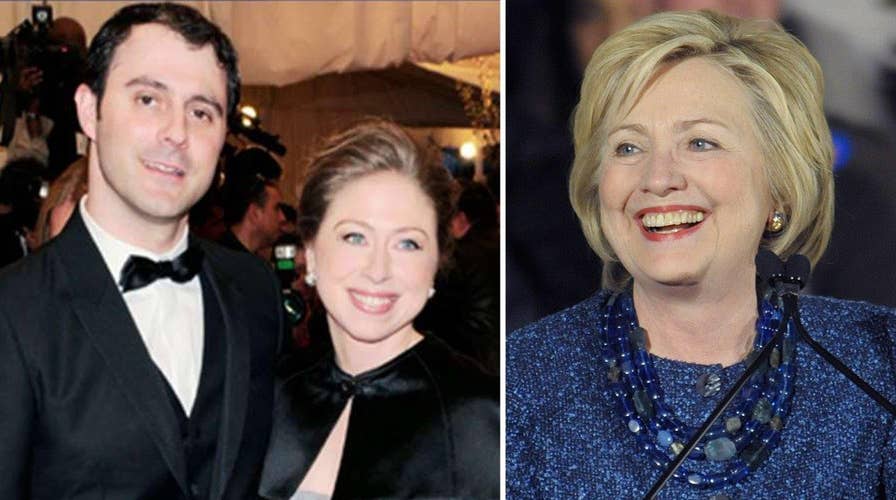Group wants Clinton probed over firm tied to son-in-law
On 'America's Newsroom,' Judge Andrew Napolitano explains the controversy over actions toward a company tied to Chelsea's husband
Hedge fund manager Marc Mezvinsky had friends in high places when he bet big on a Greek economic recovery, but even the keen interest of his mother-in-law, then-Secretary of State Hillary Clinton, wasn't enough to spare him and his investors from financial tragedy.
In 2012, Mezvinski, the husband of Chelsea Clinton, created a $325 million basket of offshore funds under the Eaglevale Partners banner through a special arrangement with investment bank Goldman Sachs. The funds have lost tens of millions of dollars predicting that bailouts of the Greek banking system would pump up the value of the country’s distressed bonds. One fund, exclusively dedicated to Greek debt, suffered near-total losses.
Clinton stepped down as secretary of state in 2013 to run for president. But newly released emails from 2012 show that she and Clinton Foundation consultant, Sidney Blumenthal, shared classified information about how German leadership viewed the prospects for a Greek bailout. Clinton also shared “protected” State Department information about Greek bonds with her husband at the same time that her son-in-law aimed his hedge fund at Greece.
That America’s top diplomat kept a sharp eye on intelligence assessing the chances of a bailout of the Greek central bank is not a problem. However, sharing such sensitive information with friends and family would have been highly improper. Federal regulations prohibit the use of nonpublic information to further private interests or the interests of others. The mere perception of a conflict of interest is unacceptable.
Through its press representative, Eaglevale declined to comment for this story. Clinton’s campaign press office did not respond to a request for comment.
A former Goldman Sachs broker himself, Mezvinsky formed Eaglevale Management with two ex-Goldman Sachs partners in October 2011. As a “global macro” firm, Eaglevale’s strategy is to seek profit opportunities in politically volatile situations. Mezvinsky set up several funds in the Cayman Islands, a secretive tax haven, with Goldman Sachs serving as Eaglevale’s prime broker and banker. The giant brokerage firm has a checkered history of manipulating the value of Greek debt to the detriment of Greece.
The same month that Eaglevale incorporated its offshore arm, Gary Gensler, the head of the United States Commodity Futures Trading Commission, which polices hedge funds, emailed Clinton that a bailout by the European Central Bank could “turn market sentiment” in favor of Greek bonds.
Gensler had previously worked as co-head of finance at Goldman Sachs; he is now the financial director of Clinton’s election campaign. Goldman Sachs has donated up to $5 million to the Clinton Foundation and $860,000 to Hillary Clinton’s political campaigns. Shortly after Clinton resigned, Goldman Sachs paid her $675,000 in speaking fees.
Clinton’s deputy in charge of economic policy was Robert Hormats, a former vice chairman of Goldman Sachs. Hormats and Clinton shared an extensive email trail about the possibility of bailing out Greece, including classified materials, and internal state department memos about the debt from the U.S. ambassador to Greece.

June 15: Demonstrators gather in front of the Parliament in Athens' main Syntagma square. (AP)
Again, monitoring Greece was part of Clinton’s job description, but, ethically, that does not mean that a family member should make bets that depend upon the actions of another family member—leaving aside the question of whether “insider” information was divulged to Mezvinsky by Blumenthal or his parents-in-law.
During 2011, Secretary of State Clinton lobbied the leaders of European governments to bail out the Greek financial system. She advocated imposing austerity measures on Greece—raising taxes, cutting public employee salaries and eliminating social welfare programs—to make the investors holding the debt happy.
Driven by investor’s belief that Greece would be bailed out, the speculative value of its debt climbed into the stratosphere in late 2011 and early 2012. The bonds gradually sank to 2008 levels by the end of the year, with temporary spikes, as investors alternately gained and loss confidence in the prospect of a bailout. In other words, there were multiple opportunities for Greek-bond hedge funds to buy cheap and sell dear.
At a February 2012 summit meeting about the Eurozone debt crisis in Munich, Clinton urged leaders of the European Union to commit to a Greek bailout.
In April, Eaglevale booked $19 million from a dozen investors. California’s public employee pension fund, CalPERS, reportedly invested $13 million. Goldman Sach’s CEO, Lloyd Blankfein, jumped in with his own money, as did Chelsea Clinton’s former boss, Marc Lasry, who specializes in buying distressed debt.
In May, Blumenthal, emailed two “confidential” memos about the Greek debt situation to Clinton. Hormats was included in the email loop.
The first memo, Blumenthal told Clinton, is “based on conversations with German Finance Minister Wolfgang Schauble and those close to him … the information comes from an extremely sensitive source and should be handled with care. This information must not be shared with anyone associated with the German government.”
The unnamed spy reported that in secret meetings with German Chancellor Angela Merkel, Schauble had searched for a politically acceptable way to bail out the Greek debt in order to avoid collapsing the economies of Greece, Italy, Spain and Ireland.
The second memo was classified and blacked out by State Department censors when Clinton’s emails were released. No doubt, it was informative.
In June, Clinton’s deputy, Jake Sullivan emailed her “a depressing snapshot” of reports that Greek banks were failing and that Merkel was against a Greek bailout. The next day, he reported “re: Greece” that Ambassador Dan Smith “just spoke to the Central Bank Governor and assessed that the economic situation was “ok for now” provided that “small depositors put money back into the banks.”
A few days later, Clinton asked Sullivan for a confidential state department report, “Solidarity Bonds Greece Revised.” He sent it to her adding, “If you like, send it on [to] WJC," presumably a reference to William Jefferson Clinton.
Clinton ordered an aide, “Pls print two copies” of the Greek bond report. The report was blacked out as a “protected” document when the emails were made public.
Did Mezvinsky benefit from his family connection?
The emails show that Clinton did at least one official favor for her son-in-law. In August 2012, she forwarded Deputy Secretary Thomas Nides an email from Mezvinsky lobbying on behalf of his former Goldman Sachs colleague, Harry Siklas.
Siklas and Goldman Sachs were invested in a deep sea mining venture called Neptune Minerals. Siklas asked Mezvinsky to broker a talk with Clinton about “current legal issues and regulations” on deep sea mining. Clinton ordered Nides to “follow up on this request.”
Nides replied, “I’ll get on it.”





